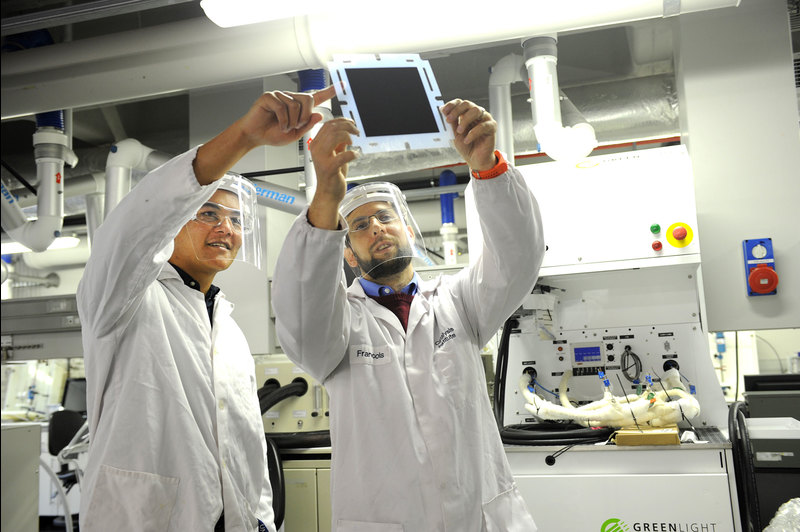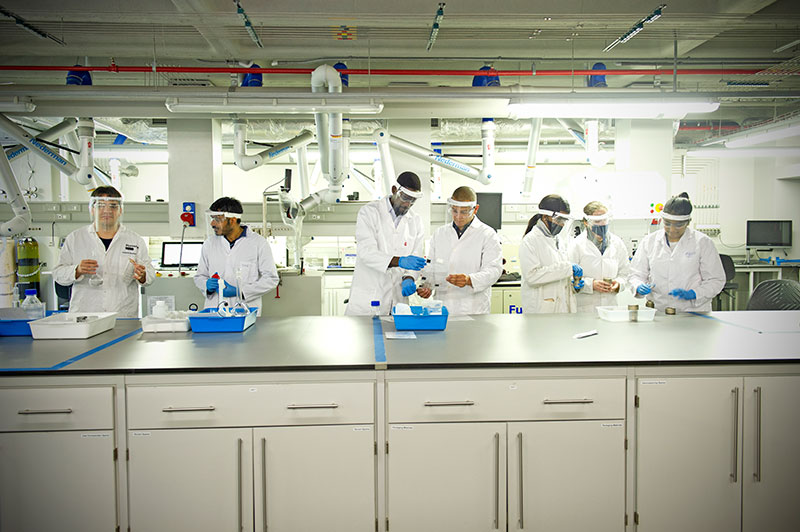Boost for electrolyser technology development towards commercialisation
05 October 2020 | Story Helen Swingler. Photos Lerato Maduna. Read time 6 min.
The University of Cape Town’s (UCT) Electrolyser Research Group within the HySA Catalysis Competence Centre has secured almost R3 million from Germany’s Federal Ministry of Education and Research (BMBF) for a two-year project to advance its electrolyser catalyst-coated membranes (CCMs) used for hydrogen production.
An electrolyser is a device that converts electrical energy into chemical energy in the form of oxygen and hydrogen. When the electrical energy is derived from renewable sources, such as wind and solar, the hydrogen that is produced can be used as a potential clean energy carrier to replace fossil fuels and help to decarbonise the global economy.
Clean hydrogen can be used for stationary and mobile electricity generation in fuel cells, as well as an industrial feedstock for large-scale chemical processes. The transition from a traditional fossil fuel-based economy to a so-called hydrogen-based economy is crucial for reducing carbon dioxide emissions, and the fight against global warming, said Dr Rhiyaad Mohamed, the head of the Electrolyser Research Group. His expertise is in the field of electrocatalysis and materials development in fuel cells and electrolysers.

Proton exchange membrane (PEM) water electrolysers make use of platinum group metal-based CCMs at its core. As a custodian of around 80% of the world’s platinum group metal reserves, this is an important step for South Africa in the transformation from a resource-based to a knowledge-based economy.
Developing capacity in Africa
With its Africa strategy, the BMBF strives to develop research capacity and foster collaboration between universities and companies in Africa.
The Electrolyser Research Group is part of HySA Catalysis, hosted by UCT’s Catalysis Institute in the Department of Chemical Engineering, and Mintek, South Africa’s national mineral research organisation.
HySA Catalysis is one of three National Centres of Competence with the mandate to develop materials, components and units in the early part of the fuel cell and hydrogen generation value chain.
“By improving the efficiency of PEM electrolysers, used to produce clean hydrogen, South Africa will be placed at the forefront of this technology development.”
The project title is “Reaction kinetic improvements by using novel catalyst layers for proton exchange membrane (PEM) water electrolysis (RAINBOW)”. The goal is to support the African partners with contract research for commercialisation through the acceleration of PEM water electrolyser CCM technologies.
“By improving the efficiency of PEM electrolysers, used to produce clean hydrogen, South Africa will be placed at the forefront of this technology development,” said Dr Mohamed.
Mohamed will work in collaboration with Professor Richard Hanke-Rauschenbach’s team at the Institute of Electric Power Systems at Leibniz University Hannover. Professor Hanke-Rauschenbach is the holder of the Chair for Electric Energy Storage Systems in Germany. His group’s work includes the analysis, design and control of energy systems with high renewable energy content, with a focus on the role that hydrogen can play in future energy systems.
The project’s commercial partner is UCT spinout company HyPlat, which will look at commercialising the electrolyser CCMs that are being developed through the project. This project is designed to directly contribute towards the industry-related research needs of HyPlat and inform their product development activities.
“The goal is the co-generation of new knowledge and intellectual property to be commercialised by HyPlat for electrolyser applications.”
“Of particular importance for HyPlat, as the commercialisation vehicle of HySA Catalysis’ technologies, is the need to develop innovative and cost-competitive PEM water electrolyser CCM technologies,” said Francois van Schalkwyk, the project leader at HyPlat. “This will in turn diversify HyPlat’s product offering and allow it to enter, and contribute to, new market segments of the PEM industry, as well as the growing hydrogen-based economy.”
The project will also fund workshops and travel between the German and South African research partners to facilitate the training of staff, as well as provide bursaries for postgraduates at HySA Catalysis.
“Ultimately, the goal is the co-generation of new knowledge and intellectual property to be commercialised by HyPlat for electrolyser applications,” Mohamed explained.
Until now, the costs of producing hydrogen from electrolysis have been high. This project hopes to change that.
“For this technology to reach widespread commercialisation, it’s crucial that the PGM-based catalyst loadings in the CCMs are reduced to a point where their performance greatly outweighs their cost,” said Mohamed.
Building blocks
Mohamed’s links to this research at UCT go back nine years. He first visited UCT’s HySA Catalysis unit as an MSc candidate at Nelson Mandela University to carry out parts of his master’s research in 2011. He returned in 2012 to complete these experiments and stayed to undertake a PhD in chemical engineering, in collaboration with researchers at the Paul Scherrer Institute in Switzerland. While there, he met with fellow PhD student at the time Dr Michel Suermann, who he would later reconnect with on this project as a postdoctoral research fellow at Leibniz University Hannover.
After completing his doctorate in 2016, Mohamed was appointed as a postdoctoral research fellow at UCT. In 2017 he was appointed as a research officer, then as the key technology specialist to start up and lead the Electrolyser Research Group.
The group has 11 other members: five MSc students, one PhD student, one postdoctoral research fellow and four research assistants. Their first MSc candidate is expected to graduate this year with distinction.
Although the COVID-19 pandemic curtailed international travel, effectively cancelling the planned project kick-off meeting last month, the South African and German groups did this virtually on 1 October.
Mohamed is upbeat about the future of their work. “Ultimately the goal of our research is to develop next-generation electrolyser CCMs comprising the novel materials that will further the commercialisation of electrolysers for renewable hydrogen production.”
 This work is licensed under a Creative Commons Attribution-NoDerivatives 4.0 International License.
This work is licensed under a Creative Commons Attribution-NoDerivatives 4.0 International License.
Please view the republishing articles page for more information.










